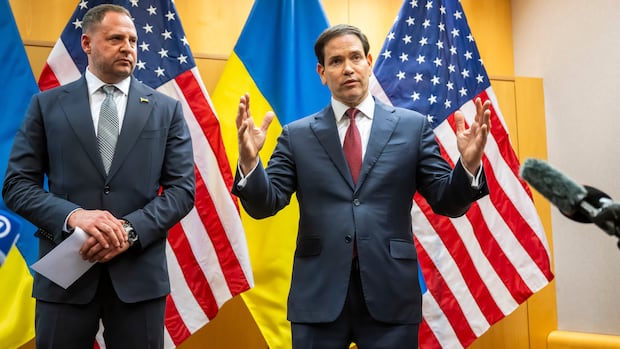Geneva, Switzerland – The United States and Ukraine are actively engaged in high-stakes discussions in Switzerland, aiming to forge a mutually acceptable peace plan to resolve the protracted conflict with Russia. These talks follow a critical agreement to modify an earlier U.S. proposal, which Kyiv and its European allies had controversially labeled a "Kremlin wish list" due to its perceived concessions favoring Moscow.
Refining the Peace Framework Amidst Controversy
On Sunday, a joint statement from the White House and Kyiv confirmed the drafting of a "refined peace framework" after initial talks in Geneva. However, specific details regarding contentious issues — such as guaranteeing Ukraine's long-term security against future Russian aggression and securing crucial funding for its massive rebuilding efforts — remain undisclosed, fueling ongoing speculation.
Zelenskyy's Call for Compromise and Accountability
Ukrainian President Volodymyr Zelenskyy emphasized the ongoing nature of these sensitive negotiations. Speaking via video link from a separate summit of Ukraine's allies in Sweden, Zelenskyy stressed the vital importance of seeking compromises that genuinely strengthen Ukraine, rather than weakening its position. He also insisted that Russia must bear the financial burden of the war, highlighting the crucial need for a decision on the use of frozen Russian assets to fund Ukraine's recovery. Zelenskyy described the current juncture as a "critical moment" for defining actionable steps to end the war and establish genuine security for his nation.
Coalition Support and Trump's Influence
The 'coalition of the willing,' comprising allied nations supporting Ukraine, is scheduled to convene via video conference on Tuesday to deliberate on the evolving peace talks. Canada, a consistent participant in previous meetings, is expected to join the European allies. A spokesperson for the European Commission indicated that significant work is still required to finalize Ukraine's peace proposals, underscoring the complexity of the diplomatic landscape.
Adding another layer of complexity, U.S. President Donald Trump has reportedly exerted pressure on Ukraine to finalize a deal. Secretary of State Marco Rubio, who led the American delegation during Sunday's talks, hinted that a previously set Thursday deadline for an agreement might be flexible. Sources familiar with the matter suggest Zelenskyy could travel to the U.S. soon for direct discussions with Trump on the plan's most sensitive aspects. Trump recently sparked controversy with a social media post asserting Ukraine's "zero gratitude" for U.S. peace efforts, a comment that echoed past contentious encounters between the two leaders.
Contentious Proposals and Ukrainian Red Lines
The initial U.S. 28-point proposal, unveiled just last week, drew strong condemnation for its demands that Ukraine cede additional territory, accept limitations on its military, and abandon its aspirations for NATO membership. These terms mirror long-standing Russian demands that Ukraine has steadfastly rejected. Ukrainian parliamentary speaker Ruslan Stefanchuk firmly reaffirmed Ukraine's "red lines," stating unequivocally that membership of both the EU and NATO are non-negotiable elements of its security guarantees and any future peace plan.
Intriguingly, Reuters sources reported that the original plan was formulated at an October meeting in Miami involving Trump's special envoy Steve Witkoff, his son-in-law Jared Kushner (a former White House adviser in Trump's first term), and Kirill Dmitriev, a Russian envoy who is currently under U.S. sanctions. While Democratic lawmakers in the U.S. criticized the proposal as essentially a Russian wish list, Secretary Rubio maintained Washington's authorship, insisting it incorporated input from both sides. In response, European allies have reportedly proposed a counter-framework that would ease some of the proposed territorial concessions and include a robust NATO-style security guarantee from the United States for Ukraine in the event of future attacks.
Kremlin's Stance and Ongoing Conflict
The Kremlin, through its spokesperson Dmitry Peskov, stated on Monday that it had not received any official information regarding the outcome of the Geneva talks. Peskov dismissed media reports about a potentially modified NATO clause, reiterating that such a "complex issue" requires official channels rather than media speculation.
On the ground, the conflict continues unabated. Russian forces have made slow territorial gains in some regions, reportedly taking control of the village of Zatyshshia in Ukraine's southeastern Zaporizhzhia region and two districts in the transit hub of Pokrovsk in the Donetsk region. Simultaneously, Ukraine's critical power and gas infrastructure remain frequent targets of drone and missile attacks, leading to widespread outages and humanitarian challenges. In a retaliatory move, a Ukrainian drone attack reportedly prompted temporary flight restrictions at Moscow's airports on Monday, and Ukraine's second-largest city of Kharkiv suffered a massive drone strike on Sunday, resulting in at least four casualties.

